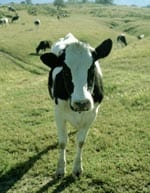What is a co-op?
by Trudy Bialic, Editor
This article was originally published in October 2002

October is National Co-op month celebrating 250 years of American co-ops
When PCC members think “co-op,” they may think of organic and sustainably grown food, discounts, or a community-owned business not beholden to out-of-state stockholders.
In fact, people join different co-ops for many reasons today, although it often has to do with saving money or supporting a certain kind of business. These characteristics have come from a long 250-year history of cooperatives in this country.
October is National Co-op Month and this year, 2002, marks the 250th anniversary of the first successful cooperative organization in America. In 1752, Benjamin Franklin initiated the “The Philadelphia Contributionship for the Insurance of Houses from Loss by Fire.” It was a volunteer fire-fighting company, made up of 30 volunteers. The Philadelphia Contributionship still serves members in Pennsylvania and New Jersey today as a mutual fire insurance company.
Co-ops are formed by people with a common need. Every day, all across America, 120 million people solve problems and enjoy a better life because of their co-ops. A Gallup survey finds that American consumers have greater confidence in the trustworthiness, pricing and commitment to quality of cooperatives than privately-owned businesses.
People have formed more than 48,000 co-ops for farming, banking, healthcare, housing, electric and telephone service, grocery retailing, and many other products and services. Aside from PCC, other well-known co-op names include REI, The Associated Press, Ace Hardware, Tru-Value Hardware, Sunkist, Ocean Spray, Land O’Lakes, CUNA Mutual Insurance Group, and Group Health.
In producer cooperatives, the people who produce the goods are the owners. Service cooperatives are enterprises such as credit unions. Worker cooperatives are enterprises where the workers are the owners.
PCC is a consumer co-op, which means we’re owned and operated by the members who shop our stores.
Your investment in co-op membership helps all of us work for cooperative principles shared by co-ops all around the world.
Common co-op principles
- Voluntary and open membership to all.
- One member, one vote. Cooperatives are democratic organizations controlled by the members, who participate in setting policies and making decisions.
- Members’ economic participation. Members contribute equally to and democratically control the capital of their cooperative.
- Education, training and information. Cooperatives provide education and training for members and staff so they can contribute effectively to the development of their cooperatives. They also inform the general public and decision-makers about the benefits and nature of cooperation.
- Cooperation among cooperatives. Cooperatives serve their members and strengthen the cooperative movement by working together through local, regional, and national and international structures. PCC participates, for example, in the National Cooperative Grocers Association.
- Concern for community. While focusing on member needs, cooperatives work for the sustainable development of their communities.
PCC’s co-op highlights
Since 1961, PCC has done many extraordinary things as a cooperative, for the common interest of our business. For example, PCC:
- Helped organize and fund the first organic growers association in Washington (Farmer’s Wholesale Co-op).
- Helped start and administer the P-Patch program in Seattle to encourage urban community gardens.
- PCC created the market for organic dairy in Washington State. When the dairy industry started using growth hormones, we provided letters of credit to farmers to go organic. In 1994, Washington had no organic dairies; now there are 13.
- Provided lines of credit or loans to organic growers including: Back Ten Co-op, Rent’s Due Ranch, Rose Valley Egg Farm, and Seattle Tilth. ¥ Established the PCC Farmland Fund in 1999 to preserve threatened farmland in Washington State and move it into organic production.
- Helped found the Northwest Cooperative Grocers Association in 1998.
- Made loans to Central Co-op, Capitol Hill Co-op, Phinney Ridge Co-op, Sno-Isle Co-op, Cascadia Loan fund.
- Provided markets for cooperatives including Equal Exchange, Organic Valley, Frontier, Galilee Herbal Remedies, Oregon Country Beef, Puyallup Valley Co-op, Organically Grown Co-op.
- Funded and supported Consumers United for Food Safety (www.purefood) in a campaign against irradiation.
- Funded and provided a staff representative for the Washington State Organic Advisory Board, Organic Trade Association, and Washington’s Food Safety Enhancement Advisory Council.
- Helped create legislation for Washington’s organic certification program.
- Sponsored a letter-writing campaign to the FDA on Dietary Supplement and Health Education Act in 1996.
- Sponsored a letter-writing campaign to the USDA to form national organic standards. PCC members sent 7,000 of the 300,000 letters received by the USDA, 1998.
- Sponsored a letter-writing campaign to label genetically altered foods, collecting 12,000 letters from members in 2000.
- Pioneered a cooking class program. (FoodWorks)
